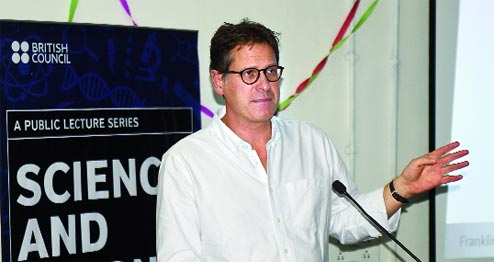Hundreds of shady "operators" are offering unproven and potentially risky stem cell therapies in different parts of the world, warned Robin Franklin, professor of Stem Cell Medicine and Head of Translational Science at Wellcome Trust, University of Cambridge, UK.
"Such therapies are often being offered to desperate people suffering from incurable diseases. Most of these private operators are selling these as 'magic medicines' extracting huge amount of money from unsuspecting patients and their families," Franklin said.
The professor was in Calcutta to deliver a public lecture at Presidency University. This was part of a public lecture series "Science and Beyond" organised by the British Council across India.
For the past three decades Franklin has been working to find out how stem cells - undifferentiated biological cells that can be coaxed into turning into any specialised cells in our body - help restore neurons affected by multiple sclerosis (MS).
In MS, a chronic genetic disorder, immune system eats away at the protective wrapping around the nerves. As a result, the nerve fibres in the brain and spinal cord cannot transmit electric impulses easily, causing a wide range of physical and mental symptoms. "The disease is common in the UK and North America. And it's increasing in Asia in the last few years," he said.
"My study is on how stem cells are able to generate a highly specialised type of brain cells that make the wrapping around the nerves and restore their normal functioning," he added.
Franklin, however, believes there's still a long way to go before the therapy is tried and tested before it reaches the patient. At one level, the concept seems so simple: here's some cell that can be turned into any cell and can replace any lost or damaged cell in the body.

"But in reality it's extremely complicated. There are so many complex layers of experiment and applications," he said. "Yet some clinicians are rushing ahead with dramatic claims."
Some claims are indeed too dramatic. According to a study reported in the journal Cell Stem Cell, the US has become a booming market for unauthorised stem cell "treatments" for everything from breast enhancements to anti-ageing facelifts, from hair transplants to "restoration of youth and virility".
The study found that at least 350 companies are marketing unapproved stem cell procedures at 570 clinics in the US. The US Federal Drug Administration cracked down on a number of such clinics and issued a draft guidelines on how stem cells must go through a rigorous approval process before being used to treat patients.
The Indian government had last year issued a guideline to prohibit all unapproved stem cell therapy. The National Apex Committee for Stem Cell Research and Therapy (NAC-SCRT), India, banned a number of advertisements that claimed that a baby's umbilical cord protects them from over 80 life-threatening diseases when they grow up.
Franklin said umblical cord blood storage had become a big business over the past few years. "So far, stem cells harvested from cord blood have only been found useful if the child gets cancer that affects the bone marrow. But most of the companies that offer to store cord blood make unscientific claims to dupe parents of a newborn."
The professor noted that there were dangers to stem cell treatments that didn't have a solid research basis or were sold in controversial stem cell clinic. "A few devastating or fatal cases may damage the long-term prospect of this promising area of modern medicine," he warned.
Shady operators must be firmly checked and patients must be made aware of the pitfalls of snake oil stem cell therapy, that's the message.











